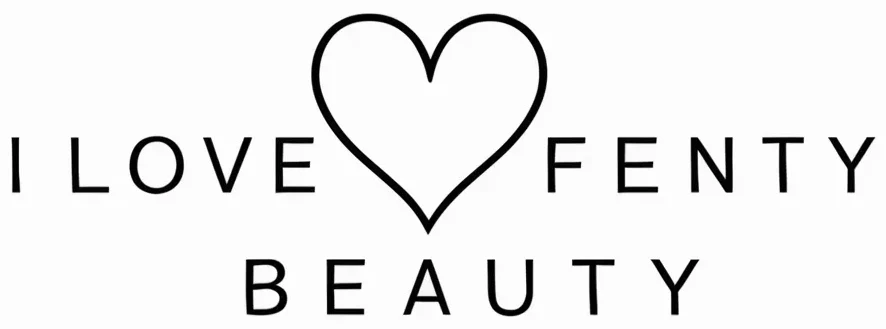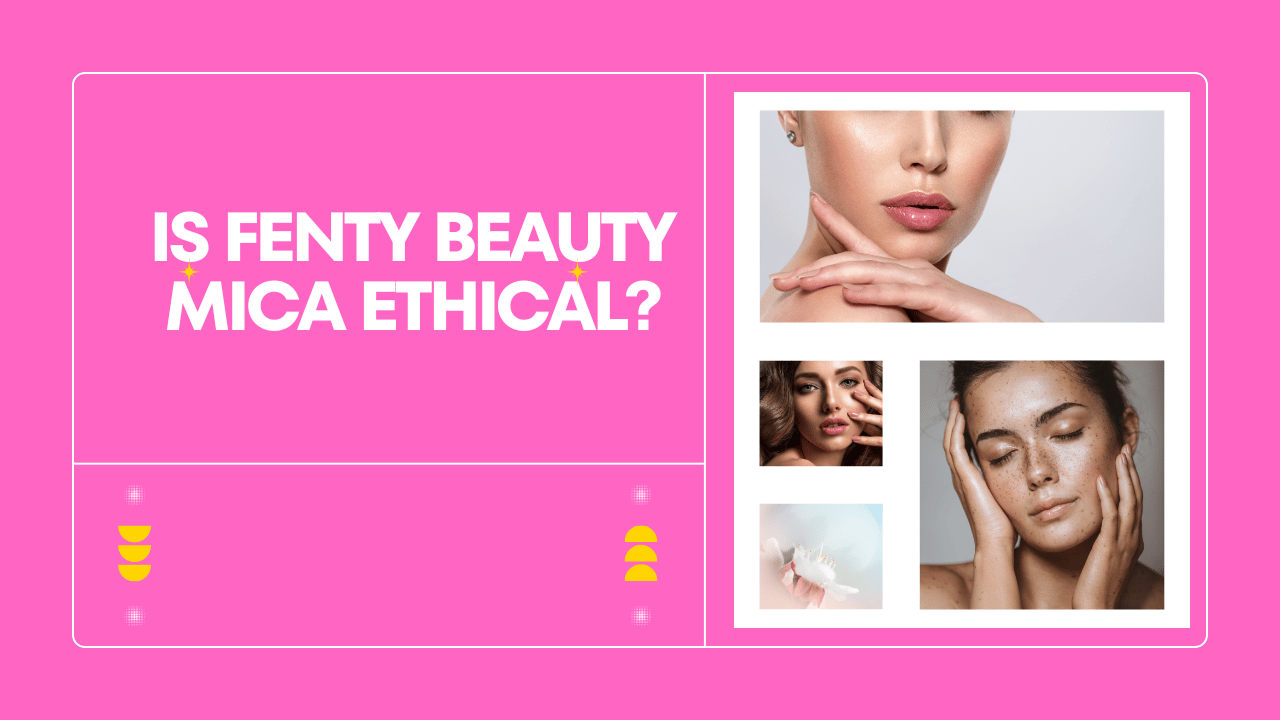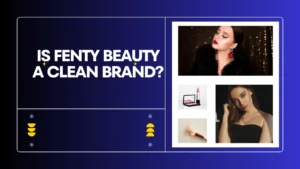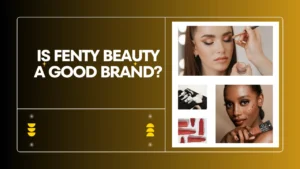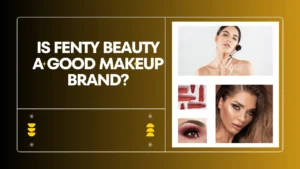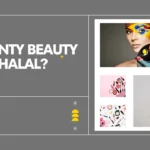We all know Rihanna’s a powerhouse.
From chart-topping hits to her revolutionary Fenty Beauty line, she redefines what it means to be inclusive and bold. But when it comes to the shimmer and sparkle in our favorite Fenty Beauty products, a question arises: is the mica ethically sourced?
Mica, that magical ingredient that gives our highlighters and eyeshadows their dazzling shine, can come with a hidden cost.
Reports of child labor and unsafe working conditions in mica mines have cast a shadow on the beauty industry. So, before you swipe on that Fenty Beauty Killawatt Freestyle Highlighter, wouldn’t you want to know if your glow comes at a human cost?
This blog post delves deeper than the dazzling effects.
We’ll explore the dark side of mica mining, Fenty Beauty’s commitment to ethical sourcing, and what you, as a consumer, can do to ensure the beauty you create doesn’t exploit others. Buckle up, because we’re about to get real about the ethics behind the sparkle.
Contents
- 1 The Role of Mica in Cosmetics
- 2 The Dark Side of Mica Mining
- 3 Fenty Beauty’s Stance on Ethical Sourcing
- 4 Consumer Awareness and Ethical Consumption
- 5 The Future of Ethical Mica Sourcing
- 6 Conclusion
- 7 FAQ’s
- 7.0.1 Is Fenty Beauty committed to ethical mica sourcing?
- 7.0.2 What are the ethical concerns surrounding mica mining?
- 7.0.3 How can I ensure that my beauty products are ethically sourced?
- 7.0.4 What can I do to promote ethical consumerism?
- 7.0.5 How can the beauty industry address ethical sourcing issues?
- 7.0.6 What are the health risks associated with mica mining?
The Role of Mica in Cosmetics
Mica is a naturally occurring mineral that is widely used in the cosmetic industry.
Known for its unique shimmering properties, mica adds a touch of sparkle and luminosity to makeup products like eyeshadow, highlighter, and blush. It can also be used as a filler in various cosmetic formulations, improving the texture and appearance of products.
The beauty of mica lies in its versatility and aesthetic appeal. It can create a range of effects, from subtle shimmer to intense sparkle. Additionally, mica can help to blur imperfections and create a more radiant complexion.
India and Madagascar are the primary sources of mica mining globally. These regions have been historically significant in producing high-quality mica, which is then used in various industries, including cosmetics.
The Dark Side of Mica Mining
Unfortunately, the glamorous world of cosmetics often masks the harsh realities of mica mining.
In many regions, particularly in India and Madagascar, child labor and unsafe working conditions are prevalent in mica mines. Children, often as young as five years old, are forced to work in hazardous conditions, risking their health and safety.
Mica miners are exposed to a range of health hazards, including respiratory illnesses caused by inhaling mica dust, skin diseases, and musculoskeletal disorders.
The harsh working conditions, coupled with poor ventilation and lack of protective equipment, further exacerbate these health risks.
Fenty Beauty’s Stance on Ethical Sourcing
While Fenty Beauty has gained recognition for its inclusive beauty philosophy, its transparency regarding ethical sourcing of mica, a key ingredient in many of its products, has been a subject of debate.
The brand has not explicitly detailed its sourcing practices or partnerships with suppliers.
It’s crucial for beauty brands to prioritize ethical sourcing and ensure that their supply chains are free from child labor and exploitative practices.
By partnering with certified suppliers and implementing rigorous due diligence processes, brands can contribute to improving the working conditions of miners and promoting fair trade.
However, Fenty Beauty, like many other beauty brands, has not publicly disclosed any specific initiatives to ensure the ethical sourcing of mica. This lack of transparency raises concerns among consumers who are increasingly demanding ethical and sustainable products.
Consumer Awareness and Ethical Consumption

As consumers become increasingly aware of the social and environmental impact of their purchases, they have the power to drive change by demanding ethical products.
By choosing brands that prioritize ethical sourcing and fair labor practices, consumers can encourage the industry to adopt more responsible practices.
Certifications like Fairmined and the Responsible Mica Initiative play a crucial role in ensuring ethical sourcing. These certifications provide assurance that the mica used in products is sourced responsibly and does not involve child labor or harmful mining practices.
Educating consumers about the importance of ethical consumption is essential. By raising awareness about the issues associated with mica mining, consumers can make informed choices and support brands that prioritize sustainability and social responsibility.
The Future of Ethical Mica Sourcing
The beauty industry is taking steps to address the challenges associated with ethical mica sourcing.
Industry-wide initiatives are being launched to promote transparency, traceability, and fair labor practices. Certifications like Fairmined and the Responsible Mica Initiative are playing a crucial role in verifying the ethical origin of mica.
Technological advancements and the development of alternative materials may offer potential solutions to the problems associated with traditional mica mining.
However, it’s important to ensure that these alternatives are also ethically sourced and environmentally friendly.
Beauty brands have a significant role to play in driving ethical sourcing practices.
By partnering with certified suppliers, conducting regular audits, and investing in traceability systems, brands can ensure that their products are free from exploitation and environmental harm.
Ultimately, it is the collective responsibility of consumers, brands, and industry stakeholders to work together to create a more sustainable and ethical future for the beauty industry.
Conclusion
In conclusion, while Fenty Beauty has made significant strides in promoting inclusivity and diversity in the beauty industry, the ethical sourcing of mica remains a complex issue.
The beauty industry, including Fenty Beauty, has a responsibility to ensure that its products are sourced ethically and sustainably.
By demanding transparency, supporting certified suppliers, and investing in traceability systems, brands can play a crucial role in addressing the challenges associated with mica mining. As consumers, we have the power to drive change by choosing brands that prioritize ethical sourcing and social responsibility.
By making informed choices and advocating for transparency, we can contribute to a more sustainable and equitable future for the beauty industry.
FAQ’s
Is Fenty Beauty committed to ethical mica sourcing?
Fenty Beauty has not explicitly detailed its specific initiatives to ensure ethical mica sourcing. While the brand has a strong commitment to inclusivity and diversity, more transparency is needed regarding its supply chain practices.
What are the ethical concerns surrounding mica mining?
Mica mining, particularly in regions like India and Madagascar, is often associated with child labor, unsafe working conditions, and environmental degradation. Miners, especially children, are exposed to hazardous conditions and health risks.
How can I ensure that my beauty products are ethically sourced?
ou can ensure ethical sourcing by:
Choosing brands that prioritize transparency and sustainability.
Looking for certifications like Fairmined and Responsible Mica Initiative.
Researching the brand’s supply chain practices and social impact initiatives.
Supporting brands that are actively working to improve the working conditions of miners.
What can I do to promote ethical consumerism?
You can promote ethical consumerism by:
Educating yourself about ethical issues in the beauty industry.
Sharing information with friends and family.
Supporting brands that prioritize ethical sourcing and fair labor practices.
Contacting brands and retailers to inquire about their sourcing practices.
How can the beauty industry address ethical sourcing issues?
The beauty industry can address ethical sourcing issues by:
Collaborating with suppliers to ensure fair labor practices and safe working conditions.
Investing in technology and innovation to develop alternative sources of mica.
Supporting certification programs that promote ethical and sustainable mining practices.
What are the health risks associated with mica mining?
Mica miners are exposed to various health risks, including respiratory diseases, skin diseases, and musculoskeletal disorders. The harsh working conditions, coupled with poor ventilation and lack of protective equipment, further exacerbate these health hazards.
